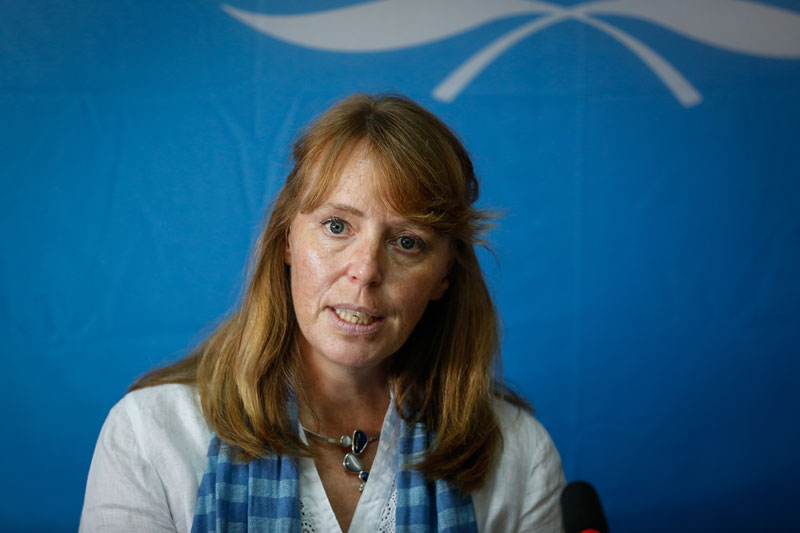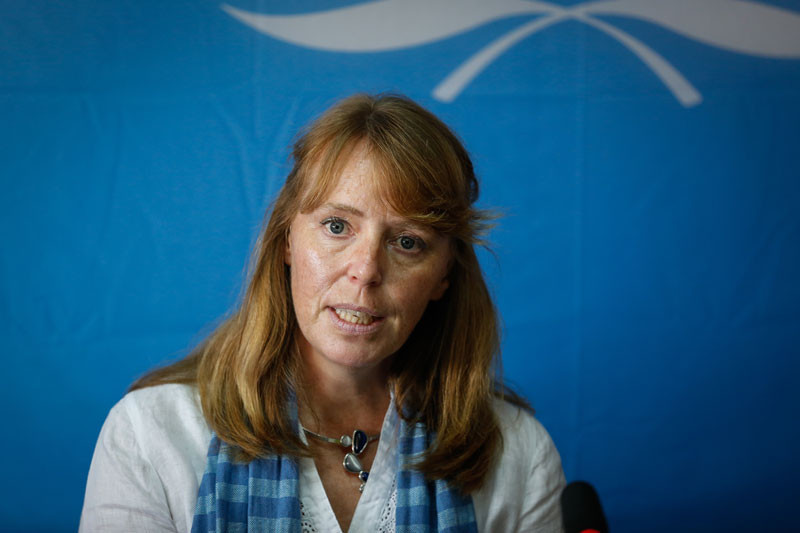Rhona Smith, the U.N.’s new special rapporteur on human rights in Cambodia, said at a press conference Thursday that she agreed with her predecessors’ calls for strengthened rule of law in the country, but added she had been impressed during her maiden visit by the government’s willingness to participate in reforms.
Local rights activists, though, expressed doubt that the government’s pledges of support for Ms. Smith and the U.N.’s human rights work were of any substance, with one describing her visit as part of a “honeymoon period.”

Ms. Smith’s remarks came at the end of a nine-day visit to Cambodia, her first after being approved as the latest U.N. rights envoy to the country in March. She is scheduled to report on her impressions to the 30th session of the U.N. Human Rights Council on Tuesday.
“I plan to build on the work of my five predecessors,” Ms. Smith said.
“I concur with the view expressed that further strengthening the rule of law, developing and ensuring the independence of those bodies with specific roles in the protection of human rights, particularly the judiciary, is essential for building the stable democratic nation that Cambodians aspire to live in.”
In November, following the arrest of a number of opposition CNRP members and land rights activists, Ms. Smith’s immediate predecessor, Surya Subedi, issued a statement criticizing the Cambodian judiciary’s lack of independence.
“Those who seek to exercise fundamental freedoms can be arrested, charged and convicted, on little or no material grounds,” Mr. Subedi said at the time. “For such cases, justice in the heavily backlogged judicial system can be remarkably swift.”
At the press conference Thursday, Ms. Smith also addressed racial discrimination, which Prime Minister Hun Sen asked the rapporteur to focus on when he met with her on Monday. Ms. Smith noted that Mr. Subedi had raised the same issue in his final statement as special rapporteur.
“There should be no room in Cambodian politics for racism, xenophobia and discrimination of any kind on any grounds,” Ms. Smith read from her predecessor’s statement, with which she said she agreed.
Government officials and rights groups have on a number of occasions leveled accusations of racism at the opposition CNRP, whose party leaders frequently use racially charged language when referring to Vietnamese people.
Speaking Thursday, though, Ms. Smith noted that the potential for discrimination to affect human rights was not limited to the political sphere.
“Whether indigenous peoples and land rights, women and access to justice, asylum seekers and the recognition of refugee status, workers and labor rights…the potential for discrimination to undermine respect for human rights is omnipresent,” she said.
Ms. Smith concluded by saying that she was heartened by the reception she received during meetings with the country’s leaders, which in addition to the prime minister included Deputy Prime Minister Sok An and the ministers of interior, justice and labor.
“I have been struck in meeting after meeting with senior government officials by their expressions of appreciation and pledges for cooperation with the Office of the United Nations High Commissioner for Human Rights,” she said.
Ou Virak, a political analyst and founder of the Future Forum think tank, said while the government was comfortable with Ms. Smith now, the situation was bound to change as her criticism of the country’s human rights situation mounted.
“This is essentially a repeat. She is starting a honeymoon period and the government is of course offering all of the flowery words to appear that they’ve been cooperating,” Mr. Virak said, noting that the same had been true for Ms. Smith’s predecessors—Mr. Subedi and Yash Ghai—before they fell out with the country’s leaders.
Ny Chakrya, head of monitoring for rights group Adhoc, agreed with Mr. Virak’s assessment of the special rapporteur’s first visit.
“We wait until the second or third mission,” he said.
“If she starts to criticize the government, I think she will have problems with the government’s cooperation.”




